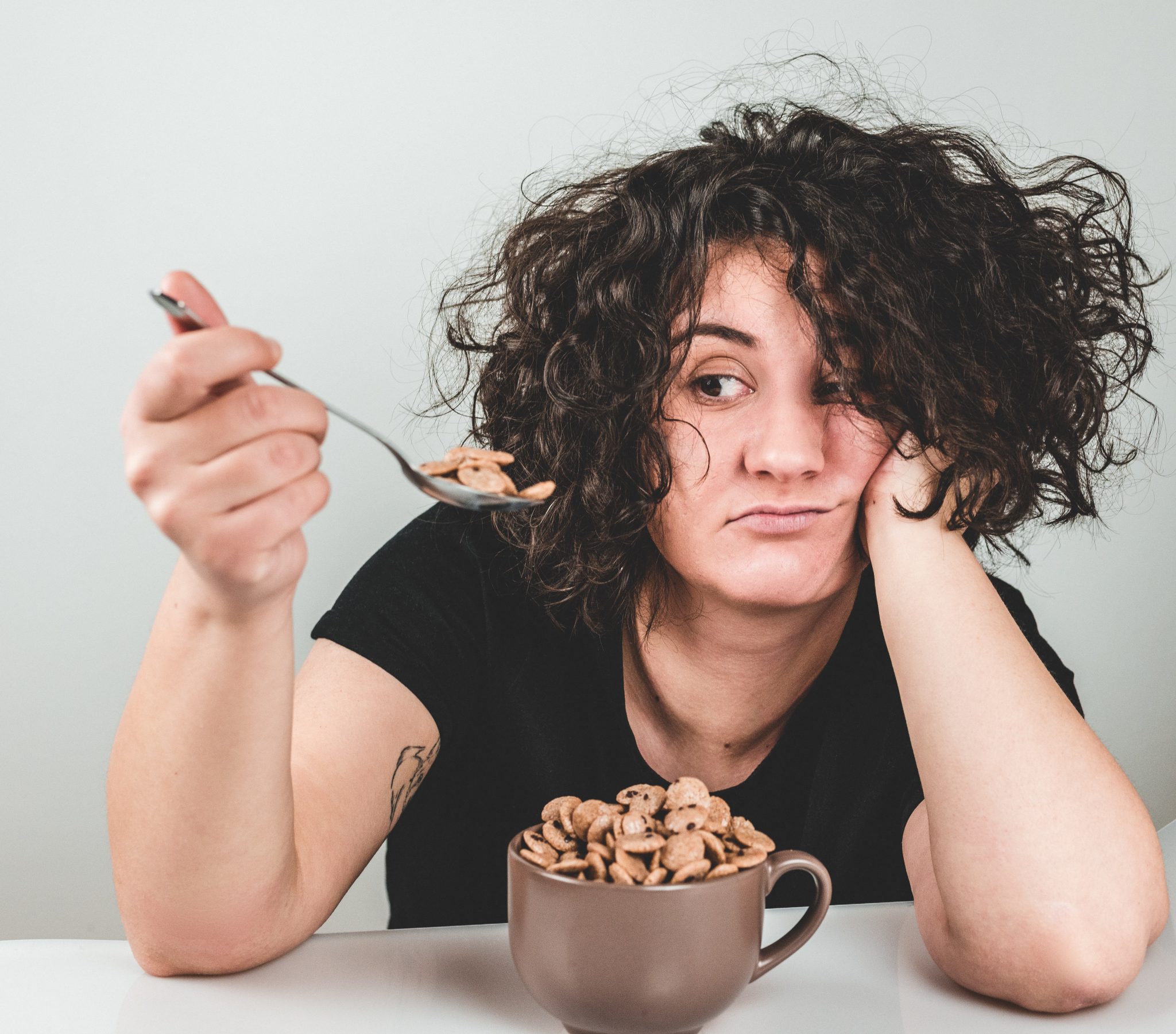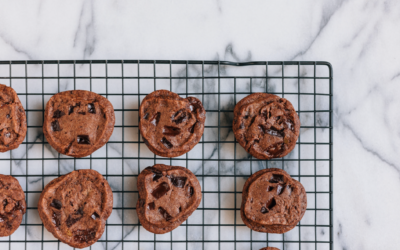Are you wondering why you binge eat and how to stop binge eating at night? Night time is a really common time of the day to experience binge eating. This is for a number of reasons which we will dive into in this article.
Firstly, let’s discuss what type of binge you are experiencing.
What is a binge?
There is a difference between a ‘subjective binge’ (what YOU define as a binge), and an ‘objective binge’ (what a psychologist uses to define an Eating Disorder).
Binge Eating Disorder (BED) is defined as regularly eating a large quantity of food in a discrete time period with a sense of feeling out of control (1). The binge eating episodes are usually accompanied with three or more following:
- Eating past the point of uncomfortable fullness
- Eating alone due to embarrassment
- Eating faster than usual
- Feeling upset and guilty afterwards
- Eating a large amount of food when not physically hungry
If you suspect you may have BED, I encourage you to discuss this with your GP.
What If I don’t meet the criteria for BED?
If you don’t meet the ‘criteria’ for BED, doesn’t mean you aren’t experiencing suffering or deserve help. A ‘subjective’ binge eating episode may still be accompanied with embarrassment, guilt, eating fast, eating a large amount of food…. but not enough food to be considered an ‘objective binge’ for a psychologist to diagnose a BED. A little silly I know.
In this article, I refer to some reasons why you may be experiencing binge eating, and in particular, we dive into how to stop binge eating at night. I also provide recommendations for how to stop binge eating at night. This article is targeted at those experiencing a ‘subjective binge’, without diagnosed BED.
Nude Nutrition Blog
How to stop food obsession
Why do I binge at night?
There tend to be 3 common reasons that cause bingeing at night.
1) Restriction during the day
It is common in diet culture to label foods such as rice cakes and salad as “safe” to eat during the day and “not allow” more substantial meals such as pasta and sandwiches.
Any time a food is out of bounds, it puts it on a pedestal increasing our desire to want to eat that food. There are two ways in which foods can be out of bounds:
- Physically: the diet restricts it.
- Psychologically: we attach a moral value to that food and label it as bad, unhealthy.
We then start to desire that food even more, because we tell ourselves we can’t have it. When we do have it, we’re likely to feel guilt and eat more () than if we’d just allowed it in the first place!
A 2001 study showed that when people were forbidden sweets that were considered “novel”, the attraction to eat them was heightened compared to people who were allowed to eat the “novel” sweet. This idea rings true for any food, not just high sugar foods. In another study, children were divided into groups and told not to eat either sweets or fruit. Both groups ate more of the restricted foods (including more fruit!) when they were given the opportunity, compared to a group who wasn’t restricted at all (7).
2) Tiredness
- If you’ve had a really long day or if you had a poor night’s sleep.
- If you’ve done a lot of exercise or if you simply have too much going on.
Being tired makes it difficult to tap into hunger and satiety cues. Studies show that being unable to get a full night’s sleep (<6 hours) interferes with our hunger hormones. These hormones dictate how much we would eat in a day. Sleep deprivation causes increased ghrelin (the hormone that stimulates hunger) and decreased leptin (the hormone that tells us when we are full).
Research also shows that tiredness can increase food intake by 400 calories a day. A systematic review that analysed 11 different studies found on average that people who had between 3.5 to 5.5 hours sleep the night before ate an additional 385 calories that day, compared to when they’d slept at least seven hours.
3) Hunger
Many clients I meet that are struggling to stop binge eating at night, are actually just hungry and haven’t tuned in to the sensations of hunger. That bowl of cereal at 8 am, and salad at lunchtime simply hasn’t cut it. Of course, they walk through the door ready to eat the house down.
So this, coupled with our hunger hormone ghrelin being revved up in the evening, means we’re in a position where we’re likely to binge. If there are foods that you are restricting, you are more likely to binge on these. If when we get home from a long day there is food in the cupboard that’s “not allowed”, of course, we are going to want to eat it … because we’re hungry and tired!
How to Stop Binge Eating at Night
Here I am sharing my experiences of working with 1:1 clients and a couple of the ways in which they have managed to stop binge eating at night.
1. Meeting your basic needs
This means two things:
a) Get organised for the week so that you feel in control, can schedule regular eating patterns and eat according to hunger.
For example:
– Making sure you have a stocked-up fridge with food that can be easily prepared and/or eaten without much fuss (unless cooking at night helps you to unwind!).
– Setting boundaries at work, or with friends/family, so you don’t take too much on.
How?
If Sunday meal prepping is your thing, go ahead and make yourself a few days worth of dinner and lunches ahead of time. But if that doesn’t sound right for you, take yourself on a shopping trip (or do an online shop) and stock your fridge and cupboard with snacks and fresh produce that don’t require too much preparation. Ready-to-eat meals that you can easily heat and eat each weeknight are great too!
Check your diary at the end of each week for the week ahead to ensure you’ve not overloaded yourself. Schedule downtime, just like you would any other activity.
If you’re struggling to eat according to hunger, check out my FREE download with a recorded audio guide and actionable workbook which tackles this.
b) Find activities/hobbies that make you feel good and check that you are meeting the basics.
What is it that makes you feel amazing?
Having a proper night’s sleep? Spending time out in nature? Making space for you time in the week? Curling up on the couch with a good book? Getting out in nature? A bubble bath? A pedicure? Sweating it out in the gym? Spending time with your fur baby? Spending time with your human baby?
Whatever it is, ensure you are meeting your basics (sleep, setting boundaries, managing stress), but also doing things that fill your heart with joy and that helps calm your mind. These types of activities are a great way to make sure that we can deal with emotions such as tiredness, anxiety, boredom, loneliness or anger without using food to suppress that feeling. Emotional eating is very common and something I have written about in more detail here.
2. Stop labelling foods as good and bad
To create a healthy relationship with food, we have to stop describing food in moral terms. Because you know what? There is no one food that will make us healthy or unhealthy.
Try to neutralise your language around food and label foods as what they are. If it’s a croissant, call it a croissant. If it’s a carrot, call it a carrot or vegetable. Neither are good, or bad. They are just-food.
Learning how to stop binge eating at night is a process. It takes time to figure out what triggers it and the sorts of things you can do to avoid it. But hopefully, after reading this, you have a few ideas up your sleeve. And just remember, if after reading this you still find yourself struggling, do not need to beat yourself up. Move on and be kind to yourself.
This is hard work and the first step is acknowledging it (which you clearly have if you are reading this). So, I encourage you to keep being compassionate and patient as you take these next brave steps to find how you’re going to do this important work.
You can sign up for my 7 Steps to Find Food Peace and Food Freedom with an audio guide and workbook to get started on how to stop binge eating at night.





